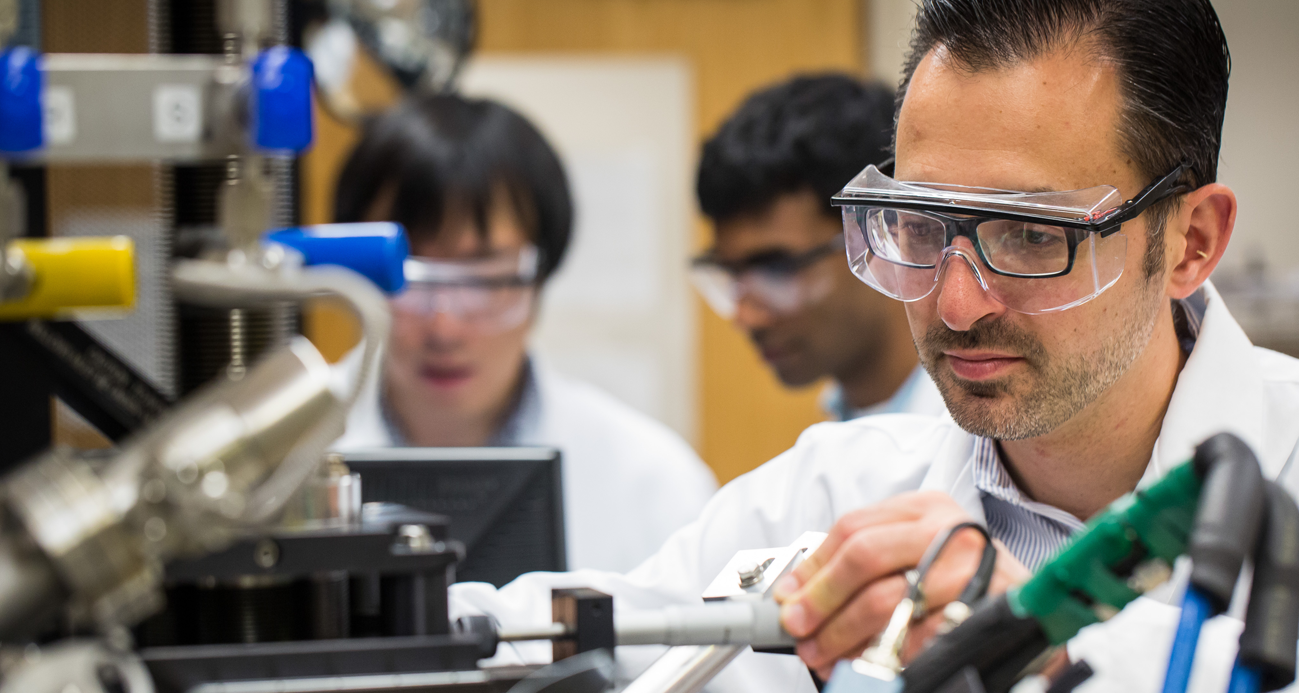The Instructional Laboratory supports courses for Georgia Tech students that combine lecture with hands-on fabrication or characterization experience. Both undergraduate and graduate students gain valuable real-world experience with advanced tool availability, laboratories, and cleanroom environments.
The Institute for Matter and Systems (IMS) provides support to Georgia Tech colleges and schools for disciplinary and interdisciplinary courses in characterization, microelectronics devices and packaging, microscopy, nano-materials, systems, and more. These hands-on courses, some of which are conducted in world-class prototype cleanroom laboratories, offer students the opportunity to experience complete process cycles from design to assembly. With approximately 150 enrolled students each year, IMS also provides the staff expertise to run the laboratory sections of the courses in its teaching cleanroom.
Course Descriptions
Environmental Nanotechnology
CEE 6315
The course is divided into two primary sections: 1) fundamentals of nanomaterials and nanotechnology and 2) the environmental applications of nanotechnology.
Fundamentals of NanoMaterials & Nanostructures
MSE 4330/6405
Introduction to nanotechnology. Description of various nanomaterials, their applications and synthesis methods.
Integrated Circuit Fabrication
ECE 4425
Introduction to microelectronic processing technologies and CMOS. A course in which students get the opportunity to learn about and experience the manufacturing technologies associated with integrated circuit fabrication. Ultimately the students fabricate basic integrated circuit elements (NMOS, PMOS, capacitors, resistors) as well as more complex CMOS circuits such as ring oscillators, inverters, NAND gates, and NOR gates. The course culminates in the characterization of the fabricated devices and circuits as well as a process design project aimed at improving the existing manufacturing process.
Introduction to MEMS
ME/ChBE/ECE 6229
Introduction to Micro-Electro-Mechanical Systems: We designed this course to span all of engineering to explore the theory and practice of MEMS (micro electrical mechanical systems) fabrication, which integrates hands-on learning with the classroom. Graduate students learn the fundamentals of engineering on the microscale while concurrently utilizing the Institute for Matter and Systems cleanroom throughout a nine-laboratory set to create microresonator sensors. Students have stated that the intellectual foundation of the classroom and the hands-on skills learned in the cleanroom were the best aspects of the course. Credit is not allowed for both ECE 6229 and ME 6229 or ChBE 6229.
Materials Characterization
MSE 2021
The fundamentals of basic microstructural and compositional materials characterization techniques are presented with an emphasis on tools using electromagnetic radiation and electrons as stimuli.
Materials Laboratory
MSE 3021
The thermophysical and transport properties of solids and fluids, i.e. heat capacity, expansion, viscosity, conduction, convection, and radiation are discussed, along with thermal analysis instrumentation.
Scattering Theory Lab
MSE 6404
A general introduction to the scattering/diffraction of electromagnetic radiation from solids. The kinematical formalism is developed emphasizing x-ray scattering as a characterization tool.
The Science and Engineering of Microelectronic Fabrication
ChBE 4050/6050
A course for senior level undergraduates in ChBE (or Chemistry) and graduate students in the chemical sciences interested in semiconductor materials and fabrication. The course presents the fundamentals and applications of materials and processes used in the fabrication of semiconductor devices, including integrated circuits. The chemical and engineering issues associated with the processing of the materials used in the fabrication of microelectronic devices are covered. The course will have five hands-on laboratory experiments which form the basic unit operations used in semiconductor microfabrication. The course will provide the fundamentals of materials synthesis, chemical and mechanical properties, and chemical reactions. In addition, the sequence of processes used to fabricate metal-oxide semiconductor (MOS) integrated circuits will be presented. The set of exploratory experiments includes silicon dioxide deposition, photolithography, diffusion and semiconductor doping, metallization and silicide formation, and integrated circuit testing. Credit will not be awarded for both ChBE 6050 and ChBE 4050.
Senior Design Capstone
MSE 4420
A team problem-solving approach is used to work on a project developed in cooperation with industry. Weekly communications, both oral and written, are required.
Space Instrumentation for Life Detection
AE/EAS 4803/8803
Special topics course for graduate and undergraduate aerospace engineering and earth and atmospheric science students
Synthesis Laboratory II
Chem 3380
Multi-step organic and inorganic synthesis. Use of the chemical literature and advanced spectroscopic techniques.
Transmission Electron Microscopy
MSE 6110
Introduction to the kinematical electron scattering theory, optics in TEM, diffraction contrast imaging of defects, dynamical electron diffraction effects; and chemical microanalysis using EDS.

